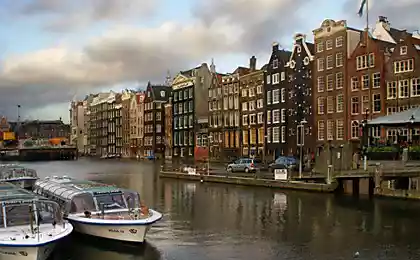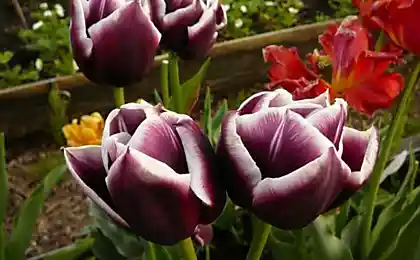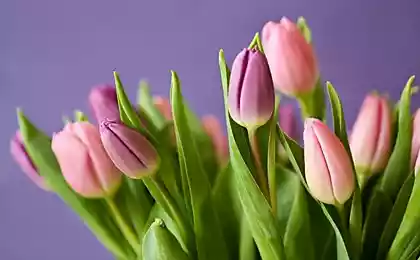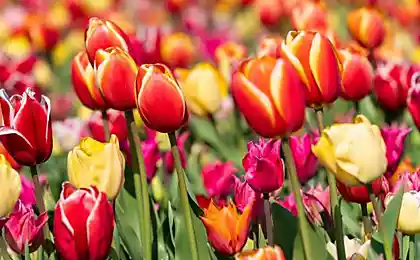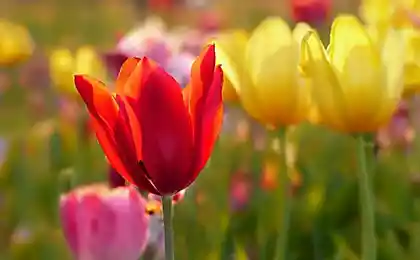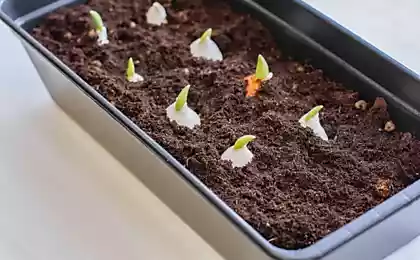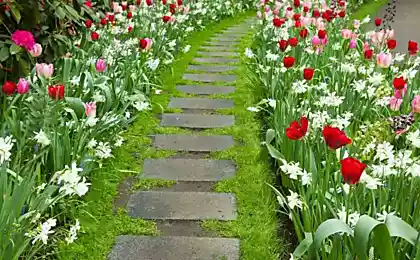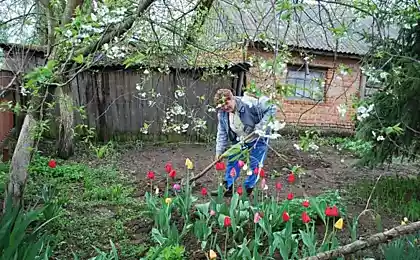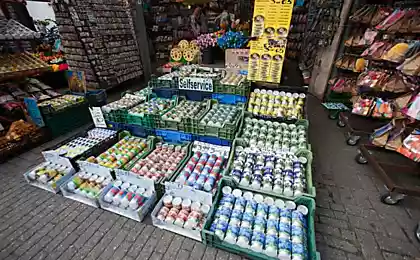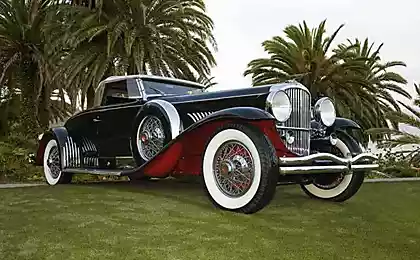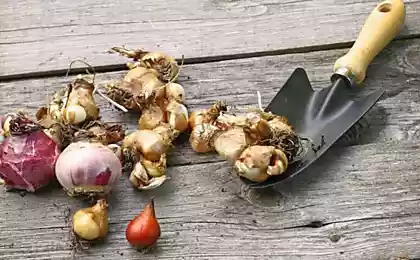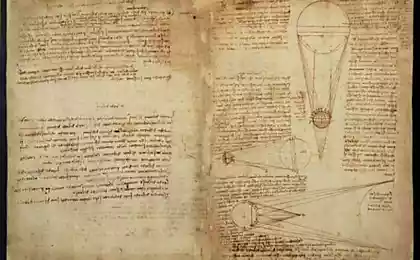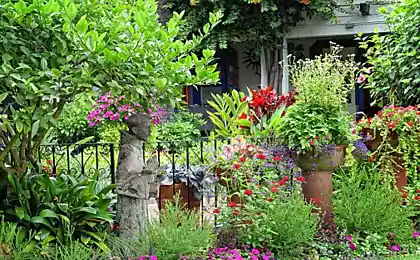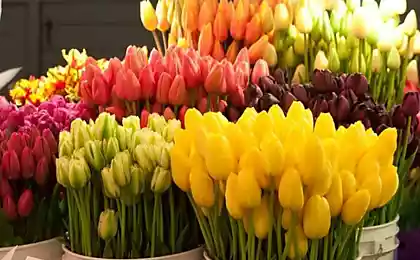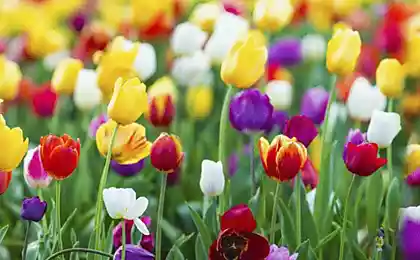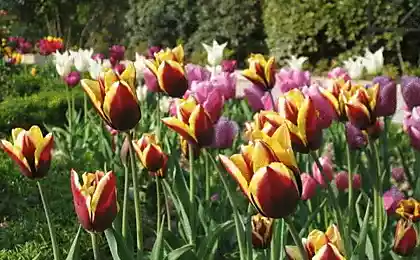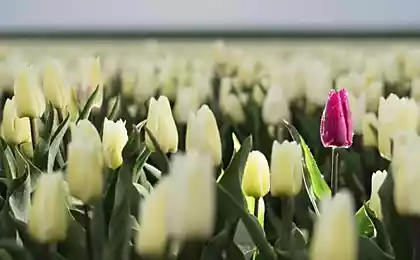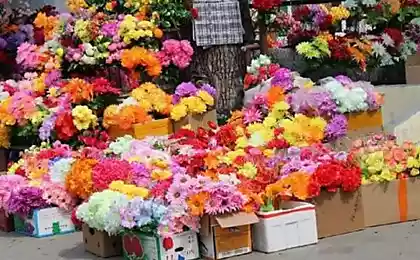4448
FloraHolland flower auction in the Netherlands
Weather flowers around the world determines the Netherlands.
All cut flowers, and 50-60% of all delivered to the world market, are sent directly to the client manufacturers deliver flowers to the Netherlands, where they put up for sale on specialized markets FloraHolland.
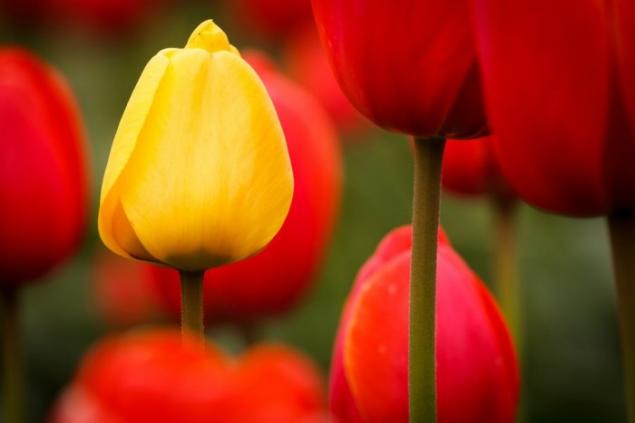
This product comes from Africa, Asia, Latin America, where production was moved all the major firms in the flower business. Dutch companies are no exception. As a result, over the past 30 years, the area clove fields in the Netherlands decreased by 10 times. A similar situation with roses, chrysanthemums and other popular colors »
Netherlands remains the world's largest center for the sale of flowers, although today they are grown there are less and import more. The exception is perhaps all that onion.
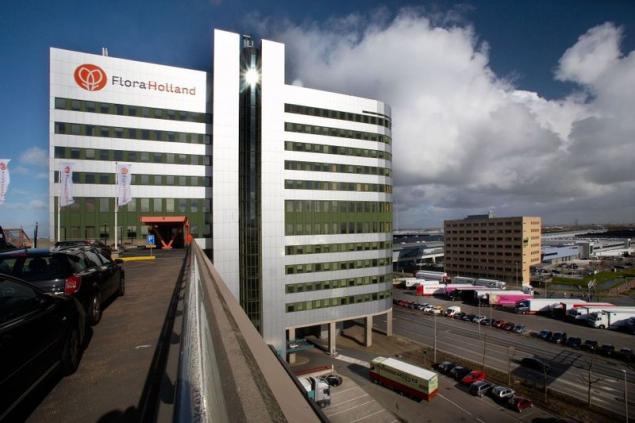
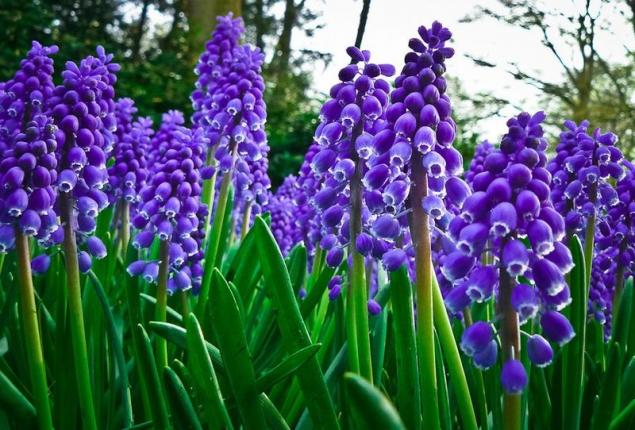
One flower business sector of the country, this trend has not touched - bulbous. Growing tulips - a national tradition, the natural conditions in the Netherlands for that perfect flower. In addition to the tulip business dominated not by large companies and small family businesses. But the total volume of their production is impressive: the best years of Dutch farmers supply the market with up to 10 billion bulbs, they account for 70% of total world production.
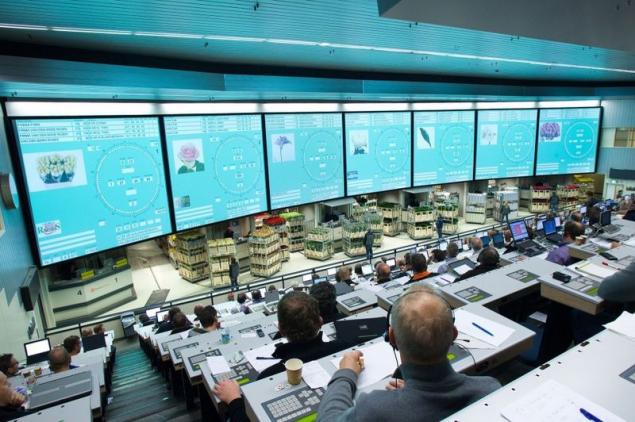
In 1909, 23-year-old Yang Hilverda began trading ornamental plants. One hundred years later, his grandson heads concern Royal Hilverda Group, which has branches in dozens of countries. Its most famous product - cloves, the main customers - companies that buy seedlings. Hilverda sells and cut flowers: Only the Dutch division annually delivers 1, 2 million carnations (and in the hottest time, such as Valentine's Day, this figure is doubled).
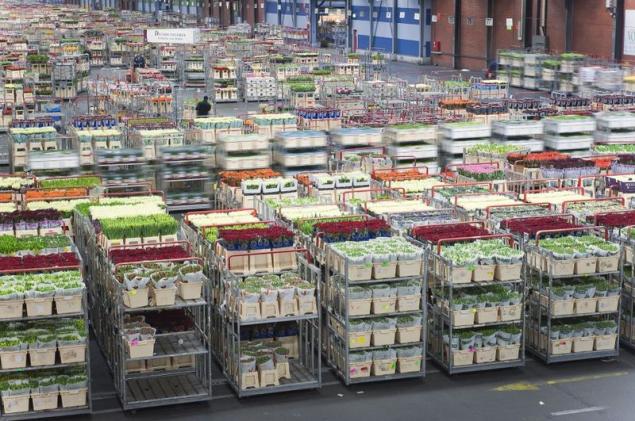
Most of the flowers and seedlings Hilverda grows outside Europe. It's not just climate. Immigrants from Turkey and Poland - the main labor force in Dutch greenhouses - receive not the biggest salary, but it still can not be below the official minimum of € 1,400 in Kenya work much cheaper. Even taking into account the cost of air travel cost of the Kenyan seedling below the Dutch. Therefore, in the Netherlands is primarily focused selection work. As spoken by Hiverda Group, in the Netherlands is not very good climate for carnations, but a good climate for innovation.
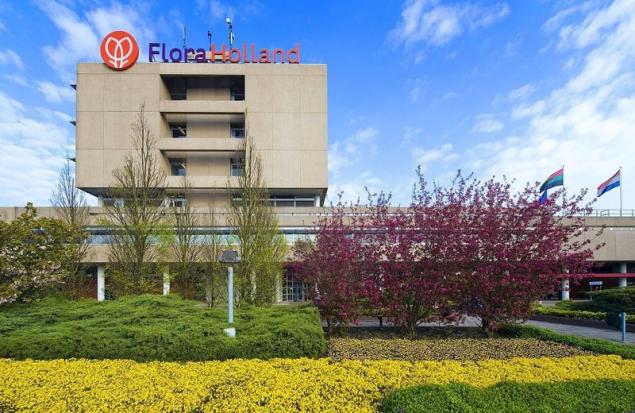
Flower Exchange Flora Holland has existed for over 100 years. Organizes its society, which includes more than 5,000 companies. And all of them are not brokers, and manufacturers. Become a co-op can any company, regardless of size. The only condition is to sell by auction all their goods.
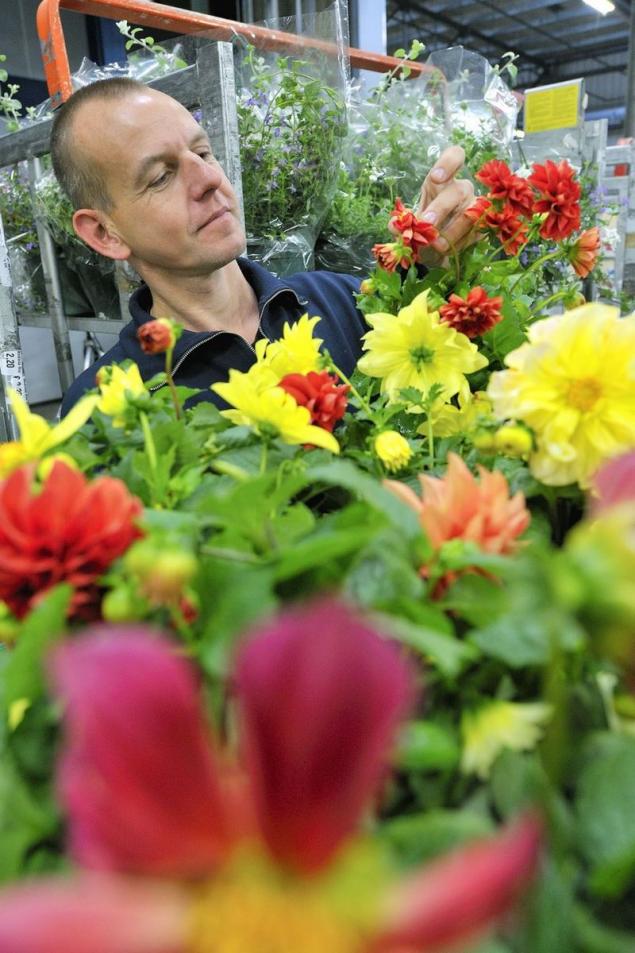
Altogether six Flora Holland auction centers. Specialty Exchange in Aalsmeer - cut flowers and foliage for bouquets. There is conducted including small-scale trade, but the heart of Flora Holland - the auction room. Large companies, which carry about every day millions of colors all over the world, commit the transaction was at auction.
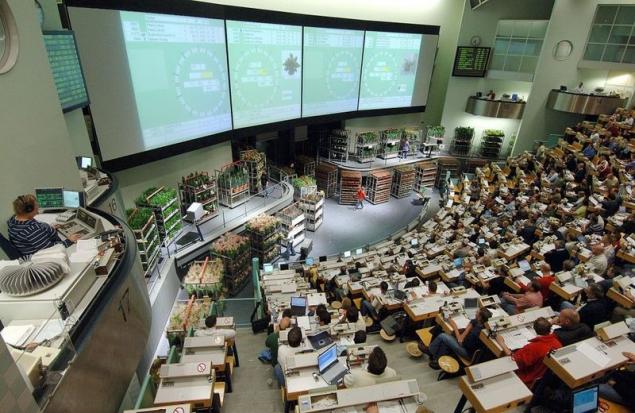
They are carried out by the so-called auction clock that shows not the time, and the current price of the lot. The basic principle of trade - falling prices. Trades last no more than a minute - so much time required direction (more precisely a point on the electronic dial) to go from maximum to minimum acceptable rate. But the arrows little chance to make the full path as soon as the clock will indicate the price that a buyer is willing to pay for the goods, he presses the button stopping trading. Trade in Aalsmeer conducted in ten hours - five on one auction room. All day trading is completed in two to three hours.
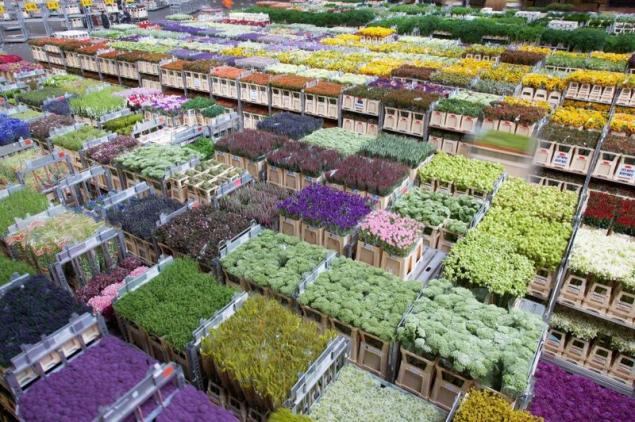
Exchange Building FloraHolland Aalsmeer - a system flowing into each other giant hangars. On the lower level is penetrated network of rails over which scurry electric vehicles (gasoline and exhaust fumes colors are contraindicated). Every 100-200 meters - giant door refrigerators. After bidding the driver collects the customer's order, just as we gather cart in a supermarket, only here "basket" may be a composition of 40-50 wagons. The train will bring order to the gate ready (for each major customer secured his), where the flowers are packed in trucks and went on a long journey.
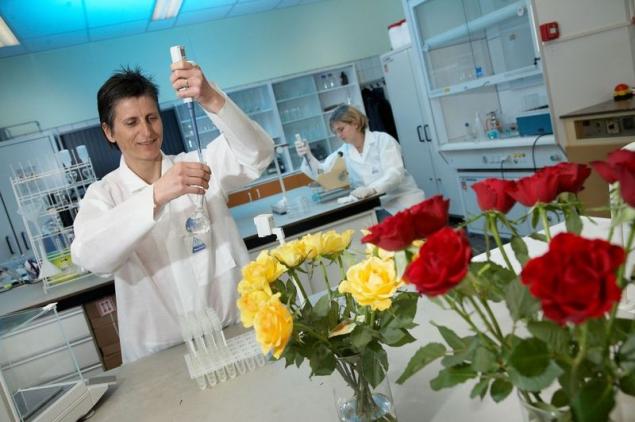
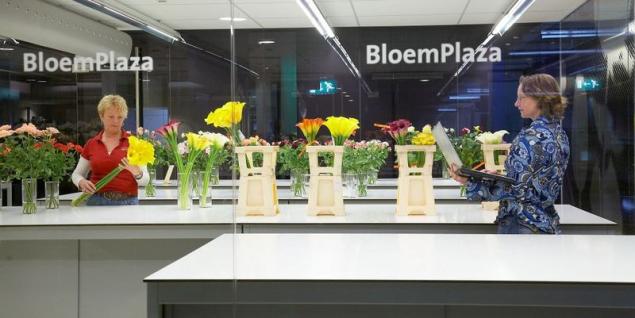
In the morning, when the clock on the tower of Amsterdam Mint strikes eight, on the floating platforms on the Singel Canal begins to move. From the basement of the building in front of and during the docking vans unloaded boxes with tulips, peonies, daffodils, lilies and roses ... ten o'clock promenade packed with people. This market is not only one of the attractions of Amsterdam, a historical place where they sell the XVII century, but also a kind of exhibition of achievements of Dutch growers.
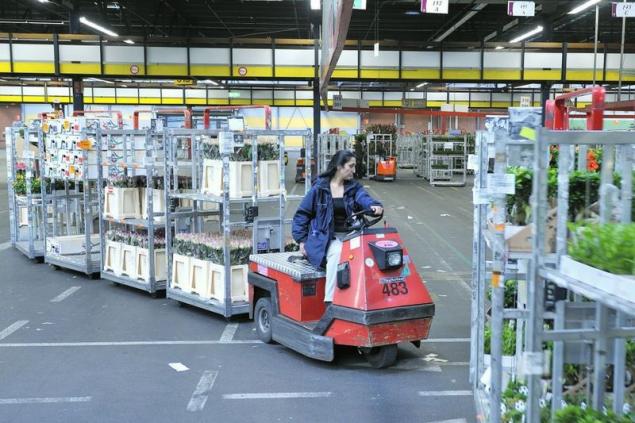
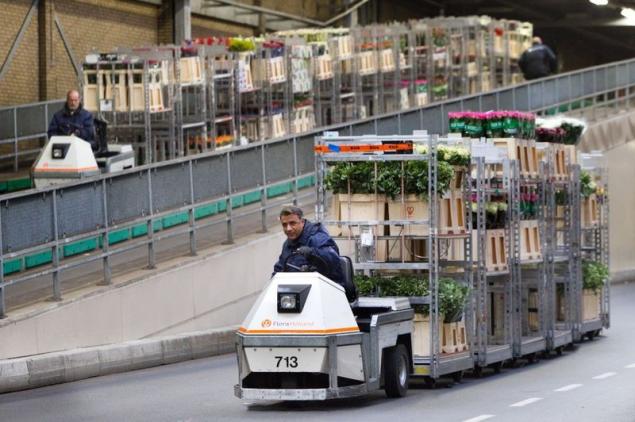
A place in the Netherlands is not one. Perhaps the main showcase of the Dutch flower industry - Keukenhof park, situated between The Hague and Amsterdam. Within two months of spring, the park is open to the public, there is more than 800 000 visitors. In an area of 32 hectares represented almost all known flowers, here goes the world's largest exhibition of lilies. But the main pride Keukenhof - tulips. Today, 91 companies provide free their best flowers for a living exhibition in Keukenhof, considering it as the best advertising their goods.
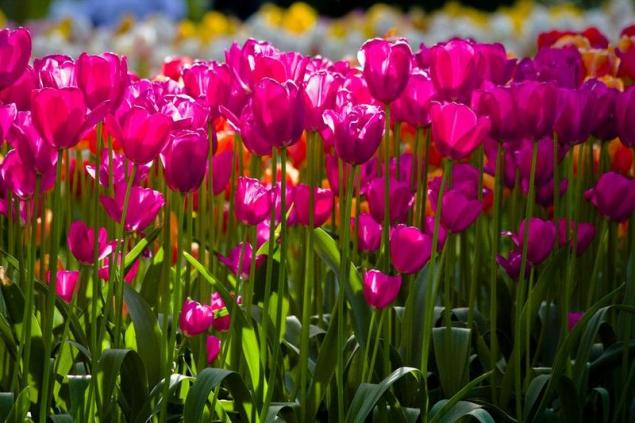
Source: newsinphoto.ru
All cut flowers, and 50-60% of all delivered to the world market, are sent directly to the client manufacturers deliver flowers to the Netherlands, where they put up for sale on specialized markets FloraHolland.

This product comes from Africa, Asia, Latin America, where production was moved all the major firms in the flower business. Dutch companies are no exception. As a result, over the past 30 years, the area clove fields in the Netherlands decreased by 10 times. A similar situation with roses, chrysanthemums and other popular colors »
Netherlands remains the world's largest center for the sale of flowers, although today they are grown there are less and import more. The exception is perhaps all that onion.


One flower business sector of the country, this trend has not touched - bulbous. Growing tulips - a national tradition, the natural conditions in the Netherlands for that perfect flower. In addition to the tulip business dominated not by large companies and small family businesses. But the total volume of their production is impressive: the best years of Dutch farmers supply the market with up to 10 billion bulbs, they account for 70% of total world production.

In 1909, 23-year-old Yang Hilverda began trading ornamental plants. One hundred years later, his grandson heads concern Royal Hilverda Group, which has branches in dozens of countries. Its most famous product - cloves, the main customers - companies that buy seedlings. Hilverda sells and cut flowers: Only the Dutch division annually delivers 1, 2 million carnations (and in the hottest time, such as Valentine's Day, this figure is doubled).

Most of the flowers and seedlings Hilverda grows outside Europe. It's not just climate. Immigrants from Turkey and Poland - the main labor force in Dutch greenhouses - receive not the biggest salary, but it still can not be below the official minimum of € 1,400 in Kenya work much cheaper. Even taking into account the cost of air travel cost of the Kenyan seedling below the Dutch. Therefore, in the Netherlands is primarily focused selection work. As spoken by Hiverda Group, in the Netherlands is not very good climate for carnations, but a good climate for innovation.

Flower Exchange Flora Holland has existed for over 100 years. Organizes its society, which includes more than 5,000 companies. And all of them are not brokers, and manufacturers. Become a co-op can any company, regardless of size. The only condition is to sell by auction all their goods.

Altogether six Flora Holland auction centers. Specialty Exchange in Aalsmeer - cut flowers and foliage for bouquets. There is conducted including small-scale trade, but the heart of Flora Holland - the auction room. Large companies, which carry about every day millions of colors all over the world, commit the transaction was at auction.

They are carried out by the so-called auction clock that shows not the time, and the current price of the lot. The basic principle of trade - falling prices. Trades last no more than a minute - so much time required direction (more precisely a point on the electronic dial) to go from maximum to minimum acceptable rate. But the arrows little chance to make the full path as soon as the clock will indicate the price that a buyer is willing to pay for the goods, he presses the button stopping trading. Trade in Aalsmeer conducted in ten hours - five on one auction room. All day trading is completed in two to three hours.

Exchange Building FloraHolland Aalsmeer - a system flowing into each other giant hangars. On the lower level is penetrated network of rails over which scurry electric vehicles (gasoline and exhaust fumes colors are contraindicated). Every 100-200 meters - giant door refrigerators. After bidding the driver collects the customer's order, just as we gather cart in a supermarket, only here "basket" may be a composition of 40-50 wagons. The train will bring order to the gate ready (for each major customer secured his), where the flowers are packed in trucks and went on a long journey.


In the morning, when the clock on the tower of Amsterdam Mint strikes eight, on the floating platforms on the Singel Canal begins to move. From the basement of the building in front of and during the docking vans unloaded boxes with tulips, peonies, daffodils, lilies and roses ... ten o'clock promenade packed with people. This market is not only one of the attractions of Amsterdam, a historical place where they sell the XVII century, but also a kind of exhibition of achievements of Dutch growers.


A place in the Netherlands is not one. Perhaps the main showcase of the Dutch flower industry - Keukenhof park, situated between The Hague and Amsterdam. Within two months of spring, the park is open to the public, there is more than 800 000 visitors. In an area of 32 hectares represented almost all known flowers, here goes the world's largest exhibition of lilies. But the main pride Keukenhof - tulips. Today, 91 companies provide free their best flowers for a living exhibition in Keukenhof, considering it as the best advertising their goods.

Source: newsinphoto.ru
